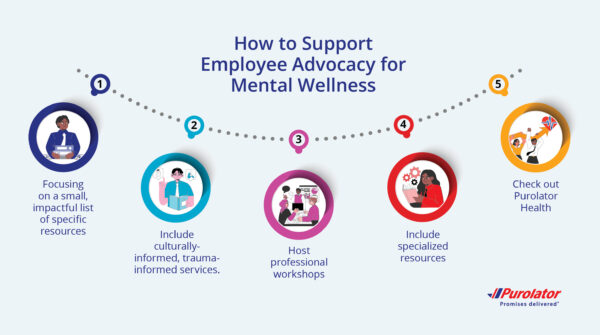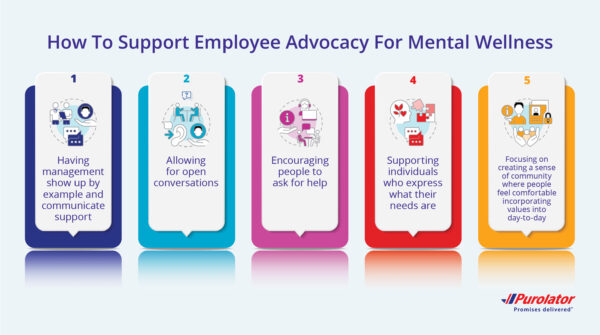Workplaces play a critical role in destigmatizing mental health and providing support for mental wellness. Seventy-five percent of employees do not feel comfortable sharing information about their mental illness in the workplace, despite 76% of those same people expressing that they would be comfortable with supporting colleagues experiencing mental health issues (CAMH). Supporting each other and providing safe places to support mental health education and resources is a key component of Purolator’s commitment to mental health.
Purolator’s commitment to the holistic health of the communities we serve is part of a progressive movement, partnering with mental health leaders like Cleveland Clinic Canada since 2020 to build mental health initiatives and programs like Purolator Health.
For Mental Health Awareness Week, Purolator sat down with Sarah Ahmed, psychotherapist and CEO of Hello Leena, Canada’s largest BIPOC (Black, Indigenous, and other people of colour) mental health provider and 2023 Purolator True North Small Business Grant winner, to share her expertise on how fellow small businesses can create a workplace that supports the overall health and well-being of individuals with diverse backgrounds. Read on to learn more, or watch the full webcast here.
How can we foster a supportive and stigma-free environment for mental wellness discussions?
Many small business (SMBs) owners and employees suffer in silence and struggle to find support with their mental health issues. In fact, 71 percent of SMBs try to solve their anxieties on their own. Changing this trend begins with creating supportive and stigma-free workplaces that facilitate open discussions about mental health.
For Sarah Ahmed, this starts with evaluating your company culture:
- Your core values. What they are and how you are communicating these in team meetings, informal discussions, and other employee interactions?
- The role of senior leadership. How is your senior leadership team providing examples of mental wellness through open discussions about day-to-day mental health struggles?
- Your workplace environment. Can employees have open discussions about mental health without fear of repercussions? Do you provide flex hours or opportunities to shift deadlines?
- Employee resources and support. Do your employees have access to mental health resources? Do they know they’re supported for prioritizing their mental wellness?
The benefits of supporting mental wellness in the workplace are clear. Organizations with higher psychological safety see:
- 74% less stress
- 76% more engagement
- 50% higher productivity
- 76% more engagement
- 40% less burnout
SOURCE: Accenture
What resources are available to help educate staff about mental health?
SMBs have shown a reluctance to seek professional help, with 100 percent of SMBs refusing to seek aid from psychologists. This can be a product of the habit of “going it alone” that’s common in small businesses, the belief that nothing can be done, and general feelings of being overwhelmed. Small businesses can combat this by ensuring employees have access to mental wellness resources and are encouraged to use them.
How can small businesses get started? Ahmed recommends:
- Focusing on a small, impactful list of specific resources. Instead of 1-800 numbers, connect your employees to specific names with contact information. This provides more direction and ease.
- Include culturally- and trauma-informed services. Include resources and services like Hello Leena, which understand the diverse backgrounds, cultural nuances, and faith-based factors of your employees.
- Host professional workshops. Invite mental health professionals to educate staff about mental wellness on a day-to-day level (eg. exercise, eating well and work life balance tips).
- Include specialized resources. Create a form that asks personalized questions to help you identify the best resources for your employee’s particular struggles that are aligned with their individual values.
- Check out Purolator Health. Purolator Health is a program spearheading initiatives and resources to provide mental health support for the communities we serve. It can be a great starting point for workplaces building employee mental health programs.
What role does compassion play in breaking down the barriers and stigma surrounding mental health care in diverse communities?
For Ahmed, destigmatizing mental health care in diverse communities and creating a community of mental wellness starts with compassion. Compassion is two-fold and includes how individuals speak to themselves and others. Evidence shows that compassion-based skills have a positive impact on:
- Stress reduction
- Better mental wellbeing
- Emotional resilience
Ahmed recommends building a sense of safety and belonging through compassion in the workplace. This allows employees to feel heard and understood, and creates the foundation for community support and mental wellness. The investment is worth it; employees who feel heard are 4.6 times more likely to feel empowered to do their best work.
How does understanding our own cultural backgrounds and those of others foster a more inclusive and supportive environment for mental health?
Ahmed emphasizes the importance of building spaces that allow employees to show up as their full selves. This includes practicing and making space for their core values, which leads to higher satisfaction in life and in the workplace. In turn, small businesses will see benefits like
- Increased employee satisfaction and happiness
- Higher retention
- Improved productivity and innovation
- More diverse teams
For Ahmed, an environment that is inclusive and supportive for mental wellness means those who need to address their mental health have the resources available or are able to advocate for what they need based on their cultural backgrounds.
How can small businesses create workplaces that facilitate advocacy for employees? Ahmed recommends:
- Having management show up by example and communicate support
- Allowing for open conversations
- Encouraging people to ask for help
- Supporting individuals who express what their needs are
- Focusing on creating a sense of community where people feel comfortable incorporating values into day-to-day activities
- Encouraging employees to connect to social networks outside of the workplace
Supporting the Mental Health of Employees of Diverse Backgrounds
For small businesses, creating a positive environment for mental wellness starts with communicating with compassion and kindness, and understanding your employees’ needs. Through mental health awareness programs and initiatives, small businesses can be part of normalizing mental health support.
For more expert advice on how your small business can promote better mental health in the workplace, check out Workplace Wellness: Insights from Dr. Morgan of Cleveland Clinic Canada on Mental Health Awareness.
Disclaimer: All content and information in this article is for informational and educational purposes only and does not constitute medical advice. Your use of this article does not establish any kind of patient-client relationship.
Please consult a qualified healthcare provider with any questions you may have about your health, a medical condition or treatment. Purolator makes no representation or warranty of any kind, express or implied, regarding the accuracy, adequacy, reliability or completeness of the information in this article, and disclaims any liability related to the use of, or reliance upon, such information.
Sarah Ahmed (MSW, RSW) is a psychotherapist and the CEO of Hello Leena, Canada’s largest BIPOC mental health provider. She completed her education at the University of Toronto. Sarah focuses on an integrative, trauma-informed, client-centered approach to build healthy relations between clients and their loved ones. She also spends her time as a motivational speaker.
Sarah Ahmed (MSW, RSW)CEO of Hello Leena
Sarah Ahmed (MSW, RSW) is a psychotherapist and the CEO of Hello Leena, Canada’s largest BIPOC mental health provider. She completed her education at the University of Toronto. Sarah focuses on an integrative, trauma-informed, client-centered approach to build healthy relations between clients and their loved ones. She also spends her time as a motivational speaker.



